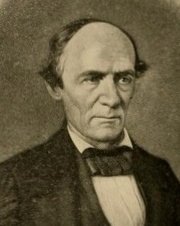Receive our blog posts in your email by filling out the form at the bottom of this page.
The young are on the voyage of life; the old have reached the harbor. - William H. McGuffey
It was 150 years ago today on May 4, 1873 that Presbyterian minister and educator William Holmes McGuffey entered into glory. Author of McGuffey’s Readers, his name lives on in many ways, and today we remember the man who has been referred to as “America’s Schoolmaster.”
Born on September 23, 1800, in Washington County, Pennsylvania, to a family of Scottish emigrants, he was educated at Greersburg Acadamey in Darlington, Pennsylvania. By the age of 14, he was working as a teacher in a one-room schoolhouse in Calcutta, Ohio. In 1826, he graduated from Washington College in Washington, Pennsylvania, and went on to join the faculty there. Three years later, he was ordained as a Presbyterian minister by Robert H. Bishop.
After teaching at Washington College, he joined the faculty of Miami University at Oxford, Ohio. In 1836, he became President of Cincinnati College. Three years later, he became President of Ohio University. In 1843, he became President of the Woodward Free Grammar School in Cincinnati. After serving as a professor at Woodward College from 1843 to 1845, he accepted an invitation to serve as the chair of moral philosophy and political economy in the University of Virginia in Charlottesville, Virginia, where he remained for the rest of his life.
It was in 1835, while teaching at Miami University — at the recommendation of his friend Harriet Beecher Stowe — that a Cincinnati publisher asked him to to create a series of four graded readers for young students. Thus, the eclectic series of McGuffey’s Readers was born. He authored the first four readers, while his brother Alexander H. McGuffey authored two more after that. These volumes were the first early reading books to gain wide-spread popularity in the American educational system. The series consisted of stories, poems, essays, and speeches. They included extracts from John Milton, Lord Byron, Daniel Webster and other highly-regard writers, as well as frequent allusions to the Bible. From 1836 to 1960, over 120 million copies were sold, and they remain in print today. They were a favorite of Henry Ford who in 1934 relocated the actual Pennsylvania log cabin where McGuffey was born to Greenfield Village in Dearborn, Michigan to create a McGuffey schoolhouse. Frequently seen in the popular TV show, Little House on the Prairie, McGuffey’s Readers have long been a household name symbolizing Christian education, much like Noah Webster’s Dictionary.
McGuffey spent nearly three decades in Charlottesville where an elementary school built in 1915 was named after him (it is now known as the McGuffey Art Center). His name adorns other institutions and buildings, and a state in his honor can be seen at Miami University. After he died there was some talk of burying his body alongside that of his first wife, Harriet, who in 1850 was buried in Dayton, Ohio, but the University of Virginia prevailed upon his family to have his earthly remains laid to rest at the University of Virginia Cemetery and Columbarium.
For McGuffey, the bond between religion and education was sacred. Christians were people of the Book, and education was essential to reading the Scriptures and understanding the world which God made. We are thankful for his labors in promoting both education and the Christian religion in a busy, productive life on earth, which came to a peaceful end 150 years ago today.

